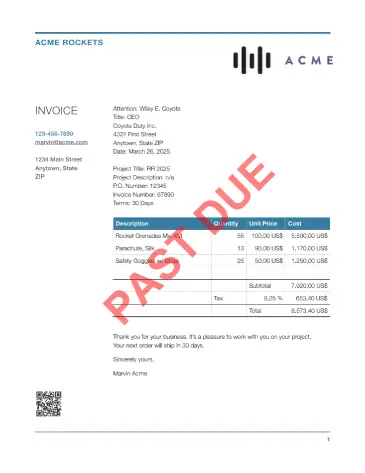Code Sample for html/2/pdf API
Rust
This Rust code demonstrates how to access the PDFTeam html/2/pdf API endpoint. This endpoint loads HTML input (either as a URL or directly as a string) and converts it to PDF. In this case, we convert an HTML invoice to a PDF and add watermarks with some text, a company logo and a QR code. The resulting PDF will be stored in AWS S3, the permalink is then returned to the caller.
We are using Rust's reqwest-module with the asynchronous tokio runtime. The POST parameters are loaded from a separate file and are then parsed with serde into a JSON object. Note that setting the json content of the reqwest-client adds the required POST content headers automatically; this is different from Node's fetch or Python's request where you have to set the headers explicitly.
Dependencies are listed in cargo.toml as follows:
// Sample Rust code for accessing the PDFTeam API, endpoint: html/2/pdf
// File: cargo.toml
[package]
name = "html-2-pdf"
version = "0.1.0"
edition = "2024"
[dependencies]
reqwest = {version = "0.12.15", features = ["blocking","json"]}
tokio = { version = "1.44.2", features = ["full"] }
serde = { version = "1.0.219", features = ["derive"] }
serde_json = "1.0.140"
POST parameters are in a separate file:
// Sample Rust code for accessing the PDFTeam API, endpoint: html/2/pdf
// File: params.json
{
"job": "ACME INVOICE",
"user": "YOUR_USERNAME",
"key": "YOUR_APIKEY",
"test": true,
"inputOptions": {
"source": "https://pdfteam.com/samples/invoice.html"
},
"outputOptions": {
"storage": true,
"file": "invoice_rust.pdf"
},
"pdfOptions": {
"format": "Letter"
},
"overlays": [
{
"position": {
"x": "left",
"y": "30mm"
},
"type": "barcode",
"config": {
"type": 19,
"data": "https://pdfteam.com"
}
},
{
"rotate": 45,
"position": {
"x": "center",
"y": "middle"
},
"type": "text",
"config": {
"data": "PAST DUE",
"font": "Helvetica Bold",
"size": 72,
"color": "#ff0000",
"opacity": 0.5
}
},
{
"position": {
"x": "132mm",
"y": "228mm"
},
"type": "image",
"config": {
"source": "https://pdfteam.com/samples/acme_logo.png"
}
}
]
}
NOTE: Setting "test" to TRUE will not consume any credits but the generated PDF carries a watermark. This flag is intended to dial in settings, like positions or style of watermarks.
Main program:
// Sample Rust code for accessing the PDFTeam API, endpoint: html/2/pdf
// File: main.rs
use std::error::Error;
#[tokio::main]
async fn main() -> Result<(), Box<dyn Error>> {
// Read params and parse into JSON object
let params = std::fs::read_to_string("params.json").unwrap();
let params_json: serde_json::Value = serde_json::from_str(¶ms).expect("Malformed JSON");
let client = reqwest::Client::new();
// Call API endpoint, json() automatically adds req'd POST headers
let res = client
.post("https://api.pdfteam.com/api/html/2/pdf")
.json(¶ms_json)
.send()
.await?
.text()
.await?;
// Print result
println!("{}", res);
Ok(())
}
Sample response with the URL of the PDF:
{"endpoint": "html/2/pdf", "job": "ACME INVOICE", "credits": 1, "result": "https://pdfteam.s3.eu-north-1.amazonaws.com/.../invoice_rust.pdf"}
Sample result:
